Arabian Night: King of the Desert Spirits (アラビアンナイト 砂漠の精霊王), released 6/14/1996, developed by Pandora Box, published by Takara
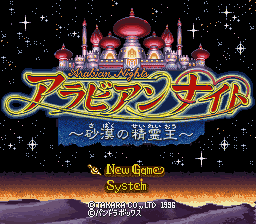
This is a game that was on my radar before I even started the blog just because of how good it looked — it’s a nice example of late SFC era graphics. I knew that some people had reviewed it negatively because of the short length and high random encounter rate, but I wasn’t sure how accurate the criticisms would be. Having played games like Last Battle that have absurd encounter rates, I’m used to having to speed up through battles, run a lot, or even use no-encounter codes (this is something I would have never done in the early days of the blog but I have softened considerably to doing this. I still haven’t done it on that many games though).
In the end I think both criticisms are fair. I finished the game in less than 10 hours, and that was including a number of optional events you have to do to get the true ending. I did use a no encounter code for some of it, although you get an ability at level 19 that can 100% escape from battles. The encounter rate is high, but that’s paired with dungeons that are needlessly large, and the fights themselves often take a fair amount of time.
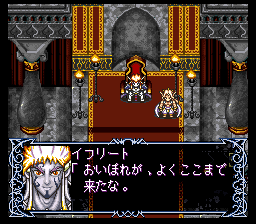
The game begins with the djinn Ifrit being defeated and enslaved by a wizard of some kind named Suleiman (the person next to Ifrit there is one of his underlings, Majnun). He becomes Suleiman’s servant for a while, but when Suleiman’s house is attacked by some mysterious power, Suleiman splits Ifrit’s power into 8 spheres that fly off to different areas, and Ifrit himself is trapped in a ring. When Ifrit grants 1000 wishes, he will be freed.
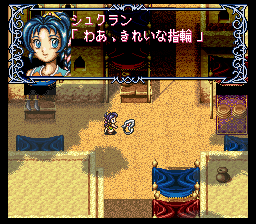
Time passes and Ifrit grants 999 wishes, so he only needs one more. A young girl named Shukuran finds the ring, and her wish is to bring peace to the land. Ifrit is kind of annoyed because granting money or power is easy, but this is going to take a while. So he’s going to have to actually go out and solve the world’s problems, although Shukuran has to come along too because he can’t move very far away from the ring.
The basic game involves finding the 8 spheres to restore Ifrit’s power, and then defeating the enemies behind the problems. To get the true ending, you have to also gain the power of the nine djinn who served under Ifrit when he was his original self. This is a typical situation where the true ending is difficult or impossible to get without a guide; some of the djinn join automatically in the story, and others just require you to go to an optional area. But a few require you to make specific dialogue choices that are not clear (in some cases it’s not even clear that the choice you are making has anything to do with recruiting a djinn). There’s one dungeon where you can take two different paths — the left path is what moves the story ahead, but if you do that it blocks off the right path which has one of the djinn recruits. Another one makes you find an item that is completely hidden without any clues. I personally don’t get as annoyed by this as some people do because I don’t mind using a guide for the true ending, but I can see why people find this frustrating.
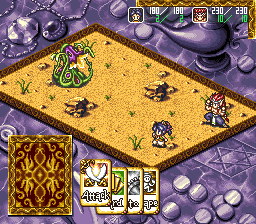
The main distinctive feature of the battle system are the Cards. You get cards from beating enemies, and they can be used in battle before a turn starts. Their effects last for 3 turns, and include damage, stat increases, nullifying special defenses, etc. A card can be cancelled by playing a higher level card, and enemies use them as well. Even if the enemies don’t do much damage, if they play a big damage card you have to get rid of it or take a lot of pain.
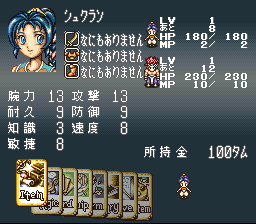
You have only three characters during the game. Shukuran will gain spells once you start forging alliances with the nine djinn. Ifrit gets spells when you recover the jewels containing his power. Harty, the third person, gets abilities from levelling up (including the all-important Escape at level 19). Frustratingly there are no healing spells in the game except for one of Shukuran’s djinns, so most of the healing is done through items. This increases the annoyance of the random encounters since the monsters are often tough and can do a decent amount of damage (especially with the cards).
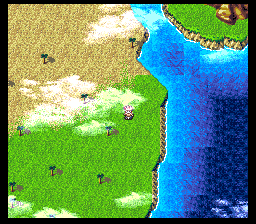
There’s not a great deal of story to go through; a lot of it is just finding the spheres and getting the djinn in events that don’t really advance the overall story.
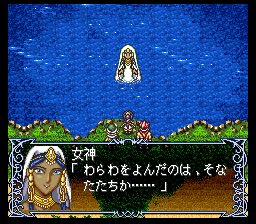
Eventually it turns out that Majnun is the one who caused all the chaos, because of how much he resented humans for trapping Ifrit and taking away his power. I believe that if you don’t fulfill the secret ending conditions, the game ends here. If you did, you learn that the Earth Mother Goddess tricked Majnun into acting this way. Suleiman knew that she was going to arrive and trapped Ifrit somehow to let the djinn build power over time to deal with her (or perhaps the journey Ifrit had to take strengthened him).
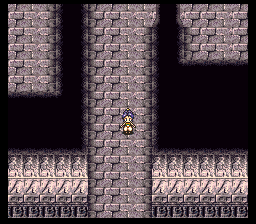
Once you beat the Earth Mother Goddess, you have the choice to release all the djinn or keep them trapped with their items; releasing them is the “best” ending but there’s actually not that much difference between them.
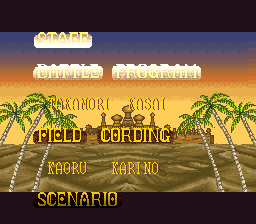
This game is OK, and worth a play if you can deal with the high encounter rate. The graphics are really nice and the music is decent as well. There is an auto battle which helps with the tedium as well.
Next up is Gulliver Boy which I have already beaten (it took 2 days) so that post will be up next week and I have a nice cushion as I start Traverse: Starlight and Prairie.
I used to play this one when I was a kid and I remember really liking the graphics on this one; looking back at it I can tell how the sprite design was heavily influenced by Chrono trigger’s, even the over world has a similar design
To be fair to the guide comments, people sometimes like to try to win these games legit, and if the dialog to get the true ending is as arbitrary as you make out, that can be very annoying.
That said, this does seem like a pretty good game despite it’s flaws.
The frame story is the Solomon and Asmodeus tradition (and the fisherman and the bottle). Do any of the events bare resemblance to well known Arabian Nights tales, such as Aladin and the like?
Not that I could see. Although I don’t know the Nights beyond the really famous ones.